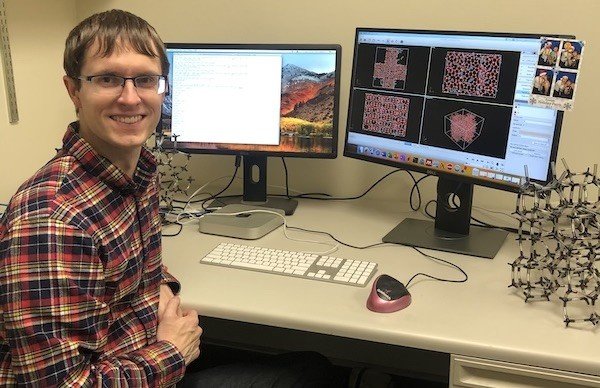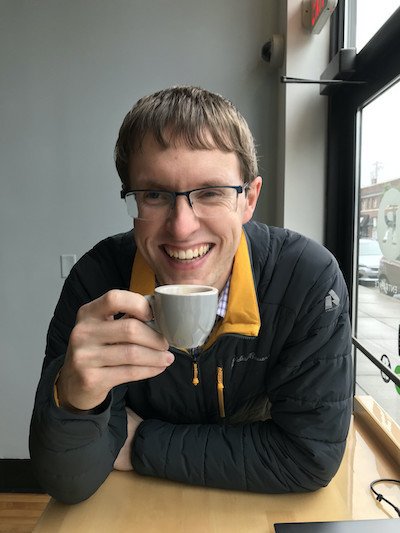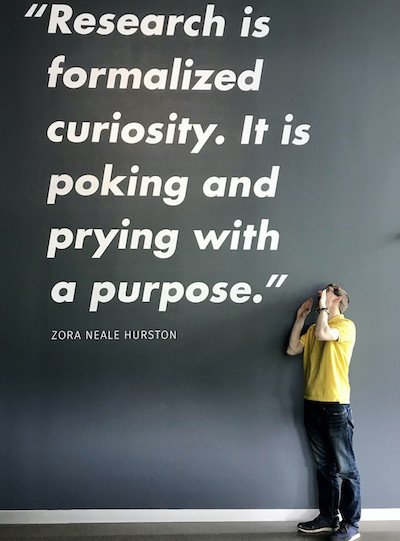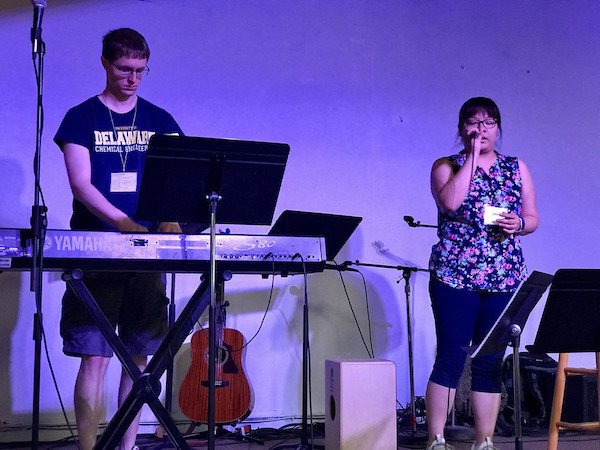Meet CTC: Tyler Josephson

October 31, 2019 -- Tyler Josephson is a postdoctoral researcher in the Siepmann group. He obtained his Ph.D. in Chemical Engineering from the University of Delaware in May 2017, in which he applied quantum chemistry calculations to investigate fundamental interactions between solvents, solutes, and catalysts in biomass processing.
Tyler is passionate about researching materials and processes that save energy, clean water, and make biorenewable chemicals possible. He learns about these concepts through simulations. This passion correlates with his career ambition of becoming a professor. He says, “When we teach and build up the next generation, we multiply progress toward a sustainable future by multiplying the engineers who come after us.”
Tyler's current research focuses on using molecular modeling and machine learning to understand adsorption thermodynamics in complex systems. Adsorption occurs when a liquid or gas sticks to a solid material. Specifically, he is predicting how BTEX (benzene, toluene, ethylbenzene, xylene) aromatics adsorb into zeolite membranes. This research is part of a partnership with ExxonMobil to integrate reaction and separation using zeolite membranes to make p-xylene in a way that is dramatically more energy efficient than the current process.

He is also using molecular simulations to predict how furans and carboxylic acid adsorb into mesoporous zeolites for making bio-based surfactants. Some of his projects also focus on improving the simulation techniques used, making simulations more efficient and figuring out new ways to analyze results.
To make these predictions, he uses Monte Carlo simulations. These simulations include using supercomputers to calculate the interactions between molecules, and searching for the most likely geometries they arrange themselves in under different conditions.
In Tyler’s spare time, he is a classical pianist, with his favorite pianist being Franz Liszt. He also loves thinking about deep topics, like theology or philosophy of science, while spending time next to a lake or in a park.
What do you enjoy most about your research?
I've most enjoyed collaborating with experimentalists who need fundamental insights into their systems, and with computer scientists with fancy new algorithms in need of a real-world application.
What has been your most interesting or surprising finding so far?
When you raise the temperature of a liquid, eventually, it turns into a vapor. The same thing happens if you have a liquid filling in tiny voids inside of porous minerals, except it’s harder to evaporate. We can do simulations to predict exactly when this happens, which can be very useful information for experimentalists and process engineers.
What are you most proud of about your academic career so far, and what’s one thing you’d like to achieve in the future?
My proudest moment was when we had finished a manuscript and we were ready to submit, my Ph.D. advisor said, “You should be the corresponding author. You know more about this than any of us.”

What drives you to be a better scientist?
There are just so many interesting problems out there! I really appreciate quality work - new, valuable discoveries presented in an effective way that teaches the reader and expands their mind.
The funding agencies drive me, too. To get funding, I need to find research ideas that are valuable to society, AND outside-of-the-box enough to be unique from what others are working on.
Why did you choose the University of Minnesota, and what led you to join the Siepmann group?
UMN is actually my undergraduate alma mater, though it was not my original intent to come back to Minnesota. I was looking for a postdoctoral position after I finished my Ph.D., and luck had it that Ilja Siepmann, who was part of my dissertation committee, had an opening at that moment. So, I took the opportunity to learn under one of the best in the field!
How did you become interested in studying chemistry, and what gets you the most excited about your field?
Mrs. Nieland, my high school chemistry teacher, introduced me to chemistry! I most remember the demonstrations she showed our class, and how she let me experiment in the labs outside of class (with supervision, of course).
I no longer work in a lab environment, having transitioned into doing computational chemistry research. I think it’s cool we can represent molecules on the computer, mix a bunch of them together, and ultimately predict the physical properties of these mixtures.
It’s most exciting when computational research leads the way in discovering reactions or materials that have not been made or measured before, and especially when the computational and experimental results agree.

What advice do you have for aspiring scientists?
Network. Learn how to make professional friends. It’s easy to neglect these with all the other things on your plate in graduate school, but your friends and colleagues will be your most valuable assets as you continue your scientific career. Science isn’t done in your own little corner - you need the friends, teachers, and students you meet along the way.
What is your favorite part about living in the Twin Cities?
The vibrant theatre culture that I enjoy very much with my wife. It’s also nice being closer to my parents, who live about two hours from the Twin Cities in rural Minnesota.
